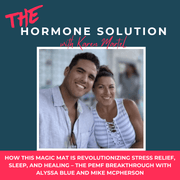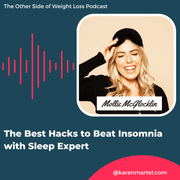Hormonal Insomnia Be Gone!
If you are one of the many women out there who suffer from insomnia - whether you have trouble falling asleep or staying asleep or both, you know how frustrating and exhausting it can be to try and find the solution. There are tons of “Sleep Hacks” out there, and many of them are excellent suggestions for getting better sleep, but if you’ve tried them all and still can’t seem to get your sleep under control, you might be suffering from Hormonal Insomnia.I have found that there are three common types of Hormonal Insomnia: that which is child-induced (meaning it appears after starting a family and having kids), that which appears after the onset of 40 (or in your late 30s), and the dreaded kind that wakes you up in the middle of the night drenched in sweat.
If any of these three facets of Hormonal Insomnia sound like you, then read on! We are going to delve into what they are exactly, what’s going on and what’s causing them, and how we can get to the root cause of your Hormonal Insomnia so we can cure it through lifestyle and diet changes as well as supplementation.
Child-Induced Insomnia Starting with the first most common type of Hormonal Insomnia: child-induced insomnia. There are a lot of hormonal shifts that go on in your body after having a baby, and there are two hormonal shifts in particular that can affect your sleep cycles. The first is your cortisol levels. With the first sounds of a crying baby in the next room or in the crib next to you, your cortisol levels start pumping! You’re awake, it’s time to breast or bottle feed, and this scenario goes on and on, throughout the night, and potentially for years on end. Your body has literally been trained to be on-call at all times and jump out of bed at the slightest sound. Secondly, post-baby, many women see a drop in their progesterone levels. Progesterone is a calming hormone and progesterone deficiency is associated with anxiety and depression, as well as water retention and weight loss resistance. So low levels of progesterone are affecting not just your sleep but are really throwing your whole body out of whack.
If this sounds like it applies to you, the solution to your insomnia woes is to calm down your system - your nervous system that is. There are a few ways in which you can do this. The first is to try adding some carbs into your diet, especially at dinner time. Not too close to bedtime as you don’t want your digestion to affect your sleep either, but adding in some carbohydrate rich foods improves your levels oftryptophan , an amino acid responsible for producing serotonin, the “happy” chemical. Another great way to calm down your nervous system is to add in some balancing and stress-relieving activities into your daily routine, like meditation, yoga or tai-chi.
Finally, you could look into supplementing withHoly Basil andPhosphatidylserine to help calm your adrenal system. Holy Basil helps calm the nervous system while Phosphatidylserine helps block cortisol. Taking these before bed can help you fall asleep, and, if staying asleep is your issue, you can set an alarm 4 or so hours after you normally fall asleep to supplement at that time, helping you get back to sleep and stay asleep through those early morning hours.
Insomnia due to Perimenopause The second common Hormonal Insomnia that I mentioned is the one that rears its ugly head right around your 40th birthday, or potentially a year or two earlier. This kind of Hormonal Insomnia also affects falling asleep as well as staying asleep. It is associated with the onset of perimenopause. The hormonal fluctuations that the body is going through start to affect your sleep. Progesterone, our calming hormone, drops a whopping 75% as we age and this imbalance between progesterone and estrogen can seriously affect your sleep.
Another issue with this type of Hormonal Insomnia has to do with the dysregulation of your cortisol levels - too much, too little, or even producing it at the wrong times (3 am, anyone?). Finally, Hormonal Insomnia in your early 40s also can be related to your thyroid function. Higher levels of estrogen can actually suppress the secretions of thyroid hormones as well as inhibit the conversion of thyroid hormones, which, guess what, furthers the progesterone deficiency. It’s a vicious cycle!
If this kind of Hormonal Insomnia is what’s affecting your sleep hygiene, you’ve got to balance your hormones. You can take the Hormone quiz on my websiteHERE , or have your hormone levels tested. I recommend testing your hormones so you can know exactly what it is that your working with instead of just guessing, especially since a lot of the symptoms can overlap and point to multiple different hormone imbalances. I have a Hormone Testing Kit for sale on my siteHERE , which also comes with a 20 minute interpretation session so we can really get to the root of your hormone imbalances. Depending on how your testing comes out will determine what steps you’ll take to balance your hormones but here are a few of the most common solutions.
You might need to try regulating your cortisol clock to make sure your cortisol levels rise and fall at the appropriate times of day. One way to do this is to get some sun on your face first thing in the morning! You’ll start sending signals to your body that it’s a new day, time to get those cortisol levels up, and energy as well. Some of the other common solutions to this type of insomnia are regulating your blood sugar through your eating habits, supplementing with anadrenal cortex extract to regulate cortisol during the daytime hours, or can using these tactics in combination with the Holy Basil, mentioned above. But overall the idea behind curing this type of Hormonal Insomnia is understanding exactly which hormones need to be addressed, and then taking steps to balance them.
Insomnia due to Night Sweats The third type of Hormonal Insomnia that we’re talking about today is the one that wakes you up in the middle of the night because you and your sheets are both completely drenched in sweat. This is actually very common for women right before they start their period and it is related to a natural drop in estrogen at this time of the month. However, if you are facing night sweats all the time, it is most likely due to perimenopause and the drop in estrogen levels that happen at this time. Abioidentical Progesterone and Estradiol cream can help with hot flashes as well as many of the other symptoms associated with perimenopause. As far as dietary solutions go, many women find that not eating chocolate, consuming alcohol or too much caffeine all help relieve hot flashes, which is essentially what your night sweats are. In fact, these three items are actually known to make hot flashes worse.
Finally, a major solution this kind of Hormonal Insomnia is to lower your stress levels. Stress is the leading cause of the symptoms that appear with perimenopause. I have many solutions for stress-relief here on my site, you can find some HERE , orHERE .
Finally, trying theKeto diet can help reduce hot flashes as well. This one is based on anecdotal evidence of many of the women I have worked with. I surmise that Keto helps manage hot flashes because this type of diet works to stabilize blood sugars, which in turn helps with cortisol levels, and that since Keto is typically high in fat, we use the good cholesterol from healthy fats to make and balance our hormones.
If you are one of the many women who are suffering from sleepless nights and lethargic days due to Hormonal Insomnia, and you’ve seemingly tried all of the sleep hacks that exist, it might be time to take a look at the root cause of your insomnia and take a hormone test to see what’s going on inside your body so you can effectively take the steps to cure it.
*Listen to podcast episode 66How to Beat Hormonal Insomnia!














